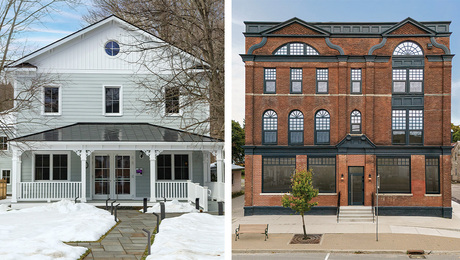Arc Fault Interrupters with Knob & Tube?
I know I’m nuts not to have upgraded the 93 year – old knob & tube wiring in my house (at least it was an electician’s own house when buildt in 1909!). But before the old plaster starts flying, is there a benefit to installing Arc Fault Interrupter breakers to help protect us? We have a 60’s or 70’s era service panel, and ONE 15 amp circuit that feeds an interior fuse box for lighting and outlets for most of the house (try that with 4 teenagers). I’m assuming it wouldn’t hurt, but might it actually cut the risks of the proverbial “giant-rat-arcing-between-conductors” fear?



















Replies
It wouldn't hurt and may be a good idea.
The down side is that they are not cheap and they will only fit into a breaker panel that is much younger than your wiring. If you have the original panel I would think it is a Edison fuse type, same size and thread as a light bulb.
They may have installed "S" type adapters. These take the ceramic screw in fuses with the smaller threads. The thread size changes with the rating of the fuse so you can't install a 40 amp fuse in a 15 amp circuit. Fuse panels cannot, as far as I know, be fitted with AFIs.
Breaker panel are the only ones that need apply for AFI and only some manufacturers have made AF breakers for their panels.
Like your house, my grandma's house has knob and tube that Grandpa installed (1913), and I'd trust it more than many "modern" wiring jobs - it's the connections that fail (as in 39 cent outlets), not the basic wire. The linen/cotton insulation could all fall off granpa's installation and it'd still be safe if you didn't fall into the wire. No problems in the close to 80 years she lived there (plus the next 10 Pop has used the house for storage). Fuses are simply pieces of solder in a ceramic box between screw posts.
IMHO as an EE, arc fault and ground fault have their place (as in aircraft with aging polyimide wiring) , but are far from a panacea in the home - I don't have a single GFI in my own home (except in parts bins) , just a nuisance when you are sure your grounding and equipment is good.
I'd agree that gfi *breakers* are a bad idea. Where gfi is required, use gfi receptacles, and only daisy chain them to other receptacles in the same room. That way you don't inconvenience anyone else when they trip, and you don't have to go mess with the panel, or even leave the room. Think of the gfi receptacle as a switch, locate it where it'll be easy to get at, and things aren't likely to be put in front of it.
-- J.S.
In general I agree. Locating GFIs near the end use is a good idea. But I have had to replace many GFI receptacles after they have failed and have several that were defective before being installed, Considering the number of GFI breakers in use they seem far more reliable. Due to various factors it is not all that uncommon for a circuit intended to be protected by a relatively cheap GFI receptacle to fail under testing and only pass when a more expensive GFI breaker is installed.
Moisture in the cables or connections. Various induced effects and marginal GFI receptacles all can contribute to these mysteries of the electrical trade. GFI breakers remain the gold standard of the trade and are widely considered safer, more durable and more consistent than their cheaper cousins.
What makes of gfi receptacles have you had trouble with? What makes have you found to be good?
-- J.S.
Beware of discount or no name or off brands of electrical equipment of any type. A GFI is safety equipment that can save a life or cost a life if it fails.
The one national brand that comes to mind as substandard is Eagle. Unless forced to I won't install them. Perhaps they have a commercial grade that I haven't seen that could redeem the brand name. Most manufacturers have different lines.
Leviton has a discount residential line that is only a little better than Eagle brand. Their receptacles, I know we are talking GFIs here but the principle is the same, are commonly on sale for 16 cents as opposed to the less expensive Eagle at 13 cents. Imagine someone getting hurt or a house fire for lack of spending an extra 3 cents.
Leviton's commercial grade GFI is good. Their industrial grade is on par with some of the best as are most Hubbel products. As with most things the value is in the middle of the market. If you buy the cheapest you end up with nothing. Going top dollar often gets you a name or features you don't need. Stick with the middle of the market or just a step better.
Edit 06/06/02. One of my favorites even in there lower end is "Pas Seimor Legrand" made in USA and worth the extra few cents. I can never remember the name as it is one that just doesn't jump to mind.
Edited 6/6/2002 10:29:54 PM ET by 4LORN1